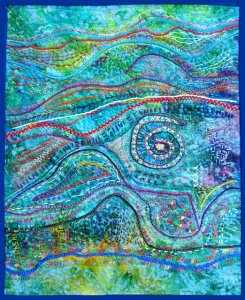GeneBlack String Theory - From the very start of this quilt I was inspired. The base fabric, a batik, has lots of visual texture. In making this quilt, I wanted to add to that texture. I also wanted to add more color to intensify the visual impact of the quilt. I also happen to love bright bold colors. As I worked on this quilt I noticed a flow begin to develop. Areas were stitched, not in a planned order, but rather as inspiration came. I let the quilt “tell me” what it wanted rather than trying to plan everything out. Symbols that have personal meaning, such as the spiral, were incorporated into the design. There are a lot of organic shapes that emerged as the quilt took form. Various areas were filled with hand stitches but also some machine stitches. In places, threads were woven through other stitches. Much like our lives, the combination, working together added strength to the whole. I sometimes used more than one thread in the needle as I had sewed. This allowed some subtle color shifts that would not be possible with a single thread. It also created a few challenges in the hand stitching. It was a great learning process for me. I chose the title String Theory for a couple of reasons. In science, string theory is a contender as a “theory of everything.” It is a way of attempting to describe the natural world and its wonder. I am fascinated by the higher sciences. The second reason is that every part of the quilt is made up of strings. Some of them are visible and some are hidden. I found the wordplay in the title appealing to me creatively.



.jpg)



Comments